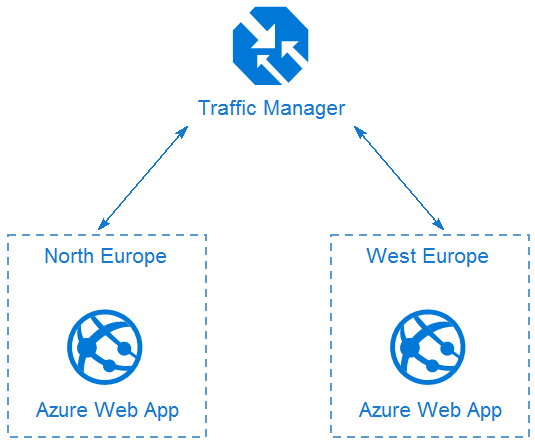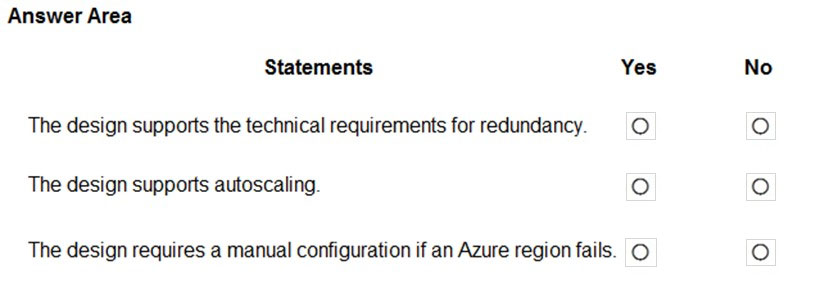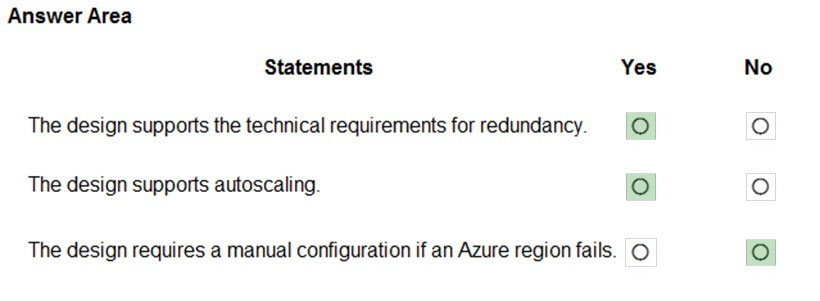HOTSPOT -
You design a solution for the web tier of WebApp1 as shown in the exhibit.

For each of the following statements, select Yes if the statement is true. Otherwise, select No.
NOTE: Each correct selection is worth one point.
Hot Area:

HOTSPOT -
You design a solution for the web tier of WebApp1 as shown in the exhibit.

For each of the following statements, select Yes if the statement is true. Otherwise, select No.
NOTE: Each correct selection is worth one point.
Hot Area:


Box 1: Yes -
Any new deployments to Azure must be redundant in case an Azure region fails.
Traffic Manager uses DNS to direct client requests to the most appropriate service endpoint based on a traffic-routing method and the health of the endpoints. An endpoint is any Internet-facing service hosted inside or outside of Azure. Traffic Manager provides a range of traffic-routing methods and endpoint monitoring options to suit different application needs and automatic failover models. Traffic Manager is resilient to failure, including the failure of an entire Azure region.
Box 2: Yes -
Recent changes in Azure brought some significant changes in autoscaling options for Azure Web Apps (i.e. Azure App Service to be precise as scaling happens on App Service plan level and has effect on all Web Apps running in that App Service plan).
Box 3: No -
Traffic Manager provides a range of traffic-routing methods and endpoint monitoring options to suit different application needs and automatic failover models.
Traffic Manager is resilient to failure, including the failure of an entire Azure region.
Reference:
https://docs.microsoft.com/en-us/azure/traffic-manager/traffic-manager-overview https://blogs.msdn.microsoft.com/hsirtl/2017/07/03/autoscaling-azure-web-apps/
I say it is Y N N for redundancy, you can use the priority traffic routing method which would automatically failover the web app if it detects a failure in the primary region. Traffic manager is a load distribution service and not an autoscaling service. You don't need manual configuration because you can use automatic in traffic manger
Although not explicit in the picture, autoscaling is on web app
Traffic manager is by design not ready to work with autoscaling. The solution will have 0 benefits from autoscaling, even if it is enabled on WebApp level. Hence: Y N N
Why traffic manager should autoscale? It only provides a load balancing service and there isn't a need to autoscale. It could manage a huge global traffic, the problem could be on app services instead. If you want more dips into traffic manager performance you can read this: https://docs.microsoft.com/en-us/azure/traffic-manager/traffic-manager-performance-considerations
Read the question carefully The design "supports" auto-scaling. The key is supports. So YYN.
Should be YYN [as WebApps can Autoscale]
My pick is Y Y N App Service can auto scale.
This is the correct answer
on exam (7-19-2021).
You repeat the same in all question, but forgot to saw your answer. The only answer I read from you, it was totally wrong.
Hey tvs, Everytime you say on exam but no answer
is autoscaling right?
Azure App Service (= Azure Web App) supports autoscaling so yes.
Autoscaling is not explicitly depicted on the diagram but it can be configured for Azure web apps, so YES
The answer is correct.
Correct answer. Azure web app auto scale feature can be used.
https://docs.microsoft.com/en-us/azure/traffic-manager/traffic-manager-routing-methods: "Azure Traffic Manager supports six traffic-routing methods to determine how to route network traffic to the various service endpoints. For any profile, Traffic Manager applies the traffic-routing method associated to it to each DNS query it receives. The traffic-routing method determines which endpoint is returned in the DNS response." "Select Priority routing when you want to have a primary service endpoint for all traffic. You can provide multiple backup endpoints in case the primary or one of the backup endpoints is unavailable." "The use of WebApp1 is unpredictable. At peak times, users often report delays. At other times, many resources for WebApp1 are underutilized." -> This calls for autoscaling which Web App does Answer is correct; Y Y N
After some research I can say yes. Correct. The design supports autoscaling. The autoscaling can be done with the AppService. I thought I had to create a load balancer in front of the autoscaled AppService. But that ist done automatically by the service. So I go with YYN.
Y Y N answer is correct. The Web App provides the feature for auto-scaling. There is no need to add any additional component in the design for auto-scaling. I go with the answer.
How about this technical req? "Web site content must be easily updated from a single point."
Question is specific to the redundancy technical requirement so Traffic manager works in this case
A web app would meet this requirement, deploy it once from (for example) Azure Devops to the app plan
On exam today 22-Dec-21
Answer is correct (YYN) https://docs.microsoft.com/en-us/azure/app-service/overview "App Service not only adds the power of Microsoft Azure to your application, such as security, load balancing, autoscaling, and automated management."
Standard pricing tier of Azure App Service. allows App Service Autoscaling, not Traffic Manager Y Y N
I say Y Y N I agree Traffic manager is a load distribution service and not an autoscaling service, but in second level in this scenario used of Azure Web App that is support Auto scaling